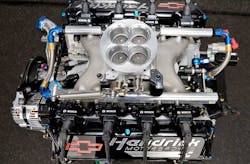NASCAR teams preparing for first year of fuel injection in sprint cup racing
Before NASCAR announced that Sprint Cup cars would be using electronic fuel injection in 2012, some racing teams – Hendrick Motorsports and Penske Racing, for instance – had already turned to the world leader in electronic fuel injection technology, Bosch, to prepare fuel-injected V-8 engines as test beds. These engines, utilizing Bosch components, duplicated the pending NASCAR engine with electronic fuel injection.
Bosch developed a Chevrolet NASCAR V-8 engine with complete electronic fuel injection for Hendrick, and a Dodge NASCAR V-8 EFI engine for Penske. Each engine featured all Bosch EFI components – including oxygen sensors, coils, ECU, fuel pump, injectors, and fuel management system, as well as Bosch racing spark plugs, alternator and starter.
“Essentially, these teams have been investing significant time and energy gaining knowledge and experience with how the new electronic fuel injection (EFI) systems will function in real world racing conditions. Their intent has been to get the maximum performance and reliability from their engines, before these engines get on the race track,” said Wolfgang Hustedt, Bosch Motorsports Manager for North America.
The test engines gave the NASCAR teams valuable insight into how EFI brings benefits on the race track:
· The ECU can make multiple changes to settings quickly, at the same time, while on the race track. This is typically not possible with carbureted systems.
· Hard to start after stalling on pit road virtually eliminated
· Reduced vapor lock
· Inertial shut-off switch for fuel pump
· Fuel consumption can be precisely matched to power required versus fuel used. The oxygen sensor is integral in this.
Some NASCAR teams, which have previously been running carburetors, have kept Bosch wide-band oxygen sensors at work in testing. “Oxygen sensors have been used on a dynamometer to calculate the best air to fuel mixture,“ Hustedt noted.
Fuel Injection, Oxygen Sensors and NASCAR Bosch Oxygen Sensors are an exclusive NASCAR Performance Product.
Beginning with this year’s Daytona 500, as NASCAR embraces fuel injection to replace carburetors, all Sprint Cup cars will utilize two NASCAR-approved Bosch wide-band oxygen sensors — one on each engine bank — to control the racing fuel injection systems.
Highly important to the electronic fuel injection system, oxygen sensors provide the car’s engine management system with air/fuel mixture data to maximize engine efficiency. Bosch invented the automotive oxygen sensor, introducing the oxygen sensor along with the pioneering automotive electronic fuel injection system in the 1970s, and is the world leader in oxygen sensor and fuel injection technology and development.
“Oxygen sensors are the key to maximum power and performance for every race car, just as they are with the everyday passenger car,” said Hustedt. “The Bosch wide-band oxygen sensors, performing for years in the crucible of Grand Am and Daytona Prototype road racing cars, are virtually the same oxygen sensors installed in many everyday family vehicles,” Hustedt added.
Sprint Cup cars will also run with NASCAR-approved Bosch fuel injectors and fuel pumps, and many Sprint Cup cars will also be running Bosch spark plugs, alternators, starters and coils.
Long Standing Support for Motorsports, Racing Products and Systems Hustedt noted that Bosch’s motorsports involvement and support began with the very first automobiles more than 100 years ago, and continues today in virtually all levels of motorsports. “Bosch works closely with NASCAR, IndyCar, Grand Am, ALMS, World of Outlaws, and drifting race teams and engineers, developing and testing products and systems, virtually throughout the year,” he said.
“Bosch spark plugs have been winning races around the world since the early 1900s, including the initial Indy 500 in 1911. These are special racing spark plugs, and their technology and heritage go into providing the performance superiority of every Bosch spark plug installed in automobiles, light trucks and SUVs on the road in North America today,” Hustedt said.
Bosch provides spark plugs, oxygen sensors, alternators and other products for various motorsports activities in addition to NASCAR, including IndyCar, Grand Am and American LeMans (ALMS) road racing, drag racing, drifting, and off-shore boats — wherever there’s competition in motion.



